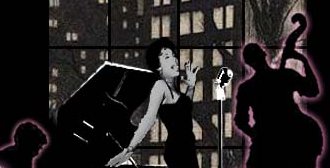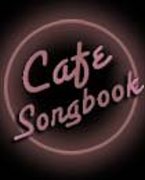Welcome toCafe SongbookInternet Home of the |
 |
 |
| Home || Songs || Songwriters || Performers || Articles and Blogs || Glossary || About Cafe Songbook || Contact/Submit Comment | |
| Search Tips: 1) Click "Find on This Page" button to activate page search box. 2) When searching for a name (e.g. a songwriter), enter last name only. 3) When searching for a song title on the catalog page, omit an initial "The" or "A". 4) more search tips. | |
Bernie Hanighen |
||
|
Basic InformationBorn: Bernard D. Hanighen, April 27, 1908, Omaha, Nebraska, (US) Died: Oct. 19, 1976 (age 68), New York City Primary songwriting role: composer and lyricist Co-writers: frequently Johnny Mercer, Raymond Scott, Cootie Williams and Neil Hefti. |
|
Overview and Commentary: |
|
 "Bob White (Whatcha Gonna Swing Tonight?)" Sheet Music |
Bernie Hanighen was one of those songwriters who wore both the music hat and the words hat. Not in the sense that Berlin and Porter did writing both words and music for their songs but in the sense of someone who on this song created the music and on that the lyrics. The music for the jazz standard "'Round About Midnight" was written by Thelonious Monk some years before Hanighen added the lyric in 1944, some say in collaboration with Cootie (Clarence) Williams resulting in a second life for it as a "darkly beautiful" vocal standard. under the modified title "'Round Midnight." With Johnny Mercer, who was his collaborator beginning in the early thirties, Hanighen was writing the music and Mercer of course the lyrics for songs such as "When a Man Loves a Woman" / "When a Woman Loves a Man"* (on which Hanighen shares the music credit with Gordon Jenkins) and "Bob White (Whatcha Gonna Swing Tonight?)" in 1937, made into a hit by Bing Crosby. *Sheet music was published with both titles and, of course, the title phrase was sung one way or the other depending on who was singing. |
 Arnold Shaw 52nd Street: The Street Of Jazz Da Capo Press (reprint of The Street That Never Slept, 1971) |
In his book 52nd Street The Street of Jazz, Arnold Shaw quotes Johnny Mercer (from a tape recording) talking about his experiences hanging out at The Onyx, a jazz club on 52nd Street in NYC during the thirties and forties with Hanighen and others. ("Gordy" is Gordon Jenkins.):
|
| back to top of page | |
Cafe Songbook |
|||
Tenor Madness performs "Show Your Linen Miss Richardson" (Bernie Hanighen (music), Johnny Mercer, lyrics)) on 2/26/2010. Hanna Richardson, tenor guitar & vocals; Stefan Vasnier, piano; Phil Flanigan, upright bass. |
|||
"My Old Man" performed by The Spirits of Rhythm, music by Bernie Hanighen, words by Johnny Mercer (Original Recording Date: December 6, 1933, New York Brunswick 6728, Leo Watson, vocal; Wilbur Daniels, tiple, Douglas Daniels, tiple; Teddy Bunn, guitar; Wilson Myers, string bass; Virgil Scoggins, percussion, vocal -- LoxiClaiborne |
Notes: album includes "My Old Man" and 23 other tracks. Spirits of Rhythm were a popular novelty band that was at its prime during the first half of the 1930s. Featuring at one point three musicians on tiples (a type of ukulele)
|
||
The Benny Goodman band with Helen Morgan on vocal perform "The Dixieland Band" (1935). |
Hanighen and Mercer teamed up in 1935 to write "The Dixieland Band" about which Alex Wilder writes: "The story here is of a second cornet player in a Dixieland group who insists upon playing sweetly, which is against all Dixieland principles. So, as Mr. Mercer says one night he hit a note that wasn't in the chord, and "apoplexy got him and he went to the Lord. "Well obviously Hanighen had to adjust the music to this musician's heresy. And he did such a splendid job that I find myself singing all the wordless places in the piano part because they're so fine" (Alec Wilder, American Popular Song The Great Innovators, 1900-1950, New York: Oxford University Press, 1972, p. 489, hardcover Ed.) |
||
|
|||
| back to top of page | |||
|
|
|||||||||||
| back to top of page | ||||||||||||
Visitor CommentsSubmit comments on songs, songwriters, performers, etc.
Feel free to suggest an addition or correction. Please read our Comments Guidelines before making a submission. (Posting of comments is subject to the guidelines. Not all comments will be posted.) |
| To submit a comment, click here. |
Posted Comments on Bernie Hanighen:
No comments as yet posted |
| back to top of page |
Credits(Bernie Hanighen page) |
Credits for Videomakers of videos used on this page:
Borrowed material (text): The sources of all quoted and paraphrased text are cited. Such content is used under the rules of fair use to further the educational objectives of CafeSongbook.com. CafeSongbook.com makes no claims to rights of any kind in this content or the sources from which it comes.
Borrowed material (images): Images of CD, DVD, book and similar product covers are used courtesy of either Amazon.com
Any other images that appear on CafeSongbook.com pages are either in the public domain or appear through the specific permission of their owners. Such permission will be acknowledged in this space on the page where the image is used.
For further information on Cafe Songbook policies with regard to the above matters, see our "About Cafe Songbook" page (link at top and bottom of every page). |
| Home || Songs || Songwriters || Performers || Articles and Blogs || Glossary || About Cafe Songbook || Contact/Submit Comment | |
© 2009-2018 by CafeSongbook.com -- All Rights Reserved |

